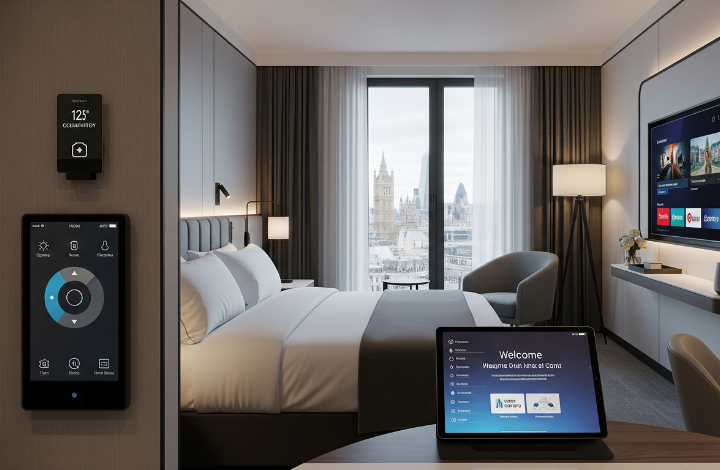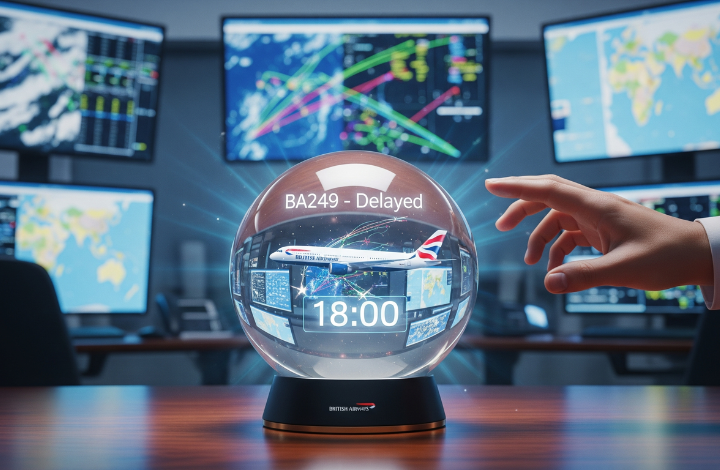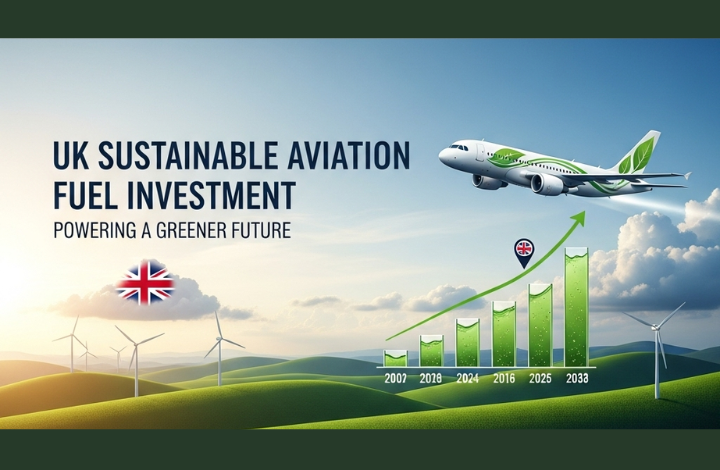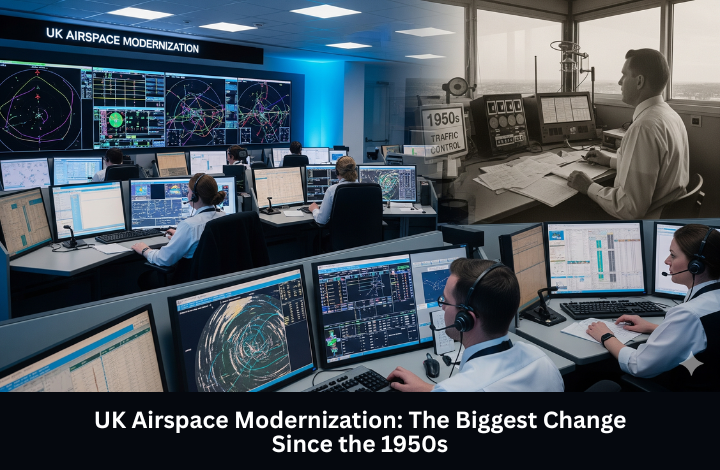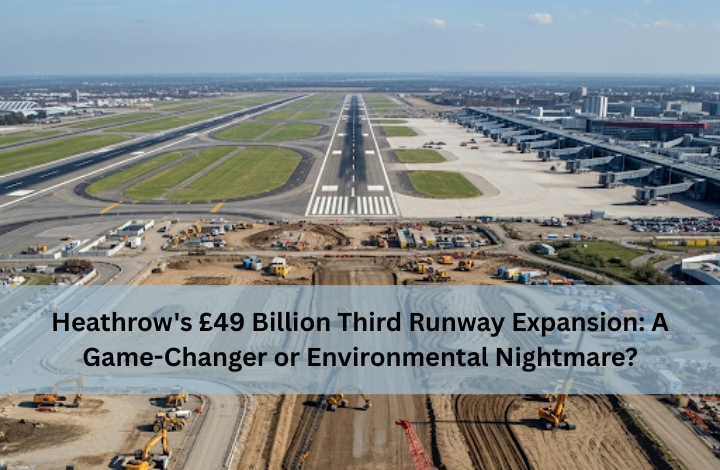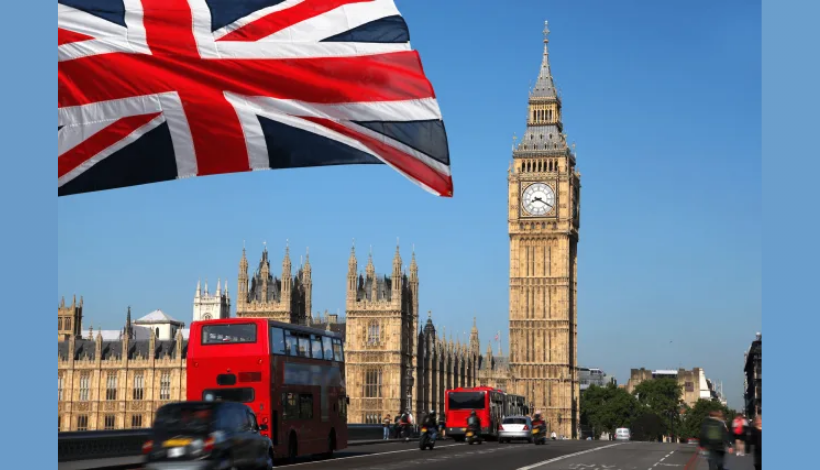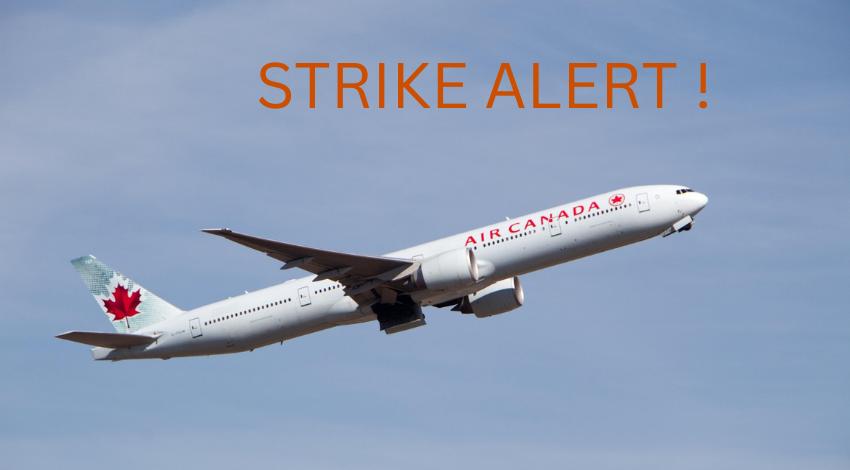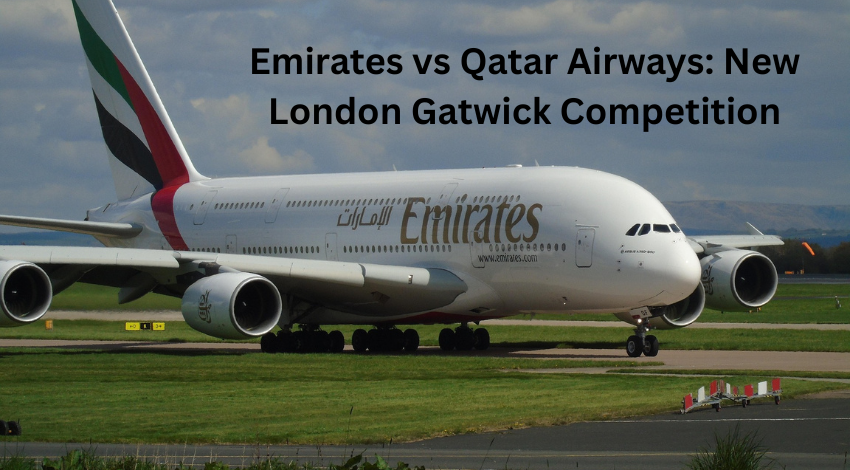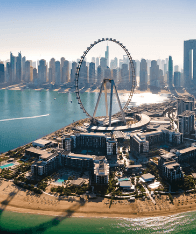Britain's hospitality industry is experiencing a technological revolution that's fundamentally transforming the guest experience. From London's most prestigious properties to boutique inns across the countryside, smart room technology has evolved from luxury amenities to essential infrastructure, delivering measurable benefits for both guests and operators. With compelling statistics and real-world case studies, this transformation represents a significant shift in how UK hotels operate and compete.
Market Growth and Investment in the UK
The British hospitality sector is at the forefront of the global smart technology adoption, with impressive market growth validating this strategic investment. The UK AI in hospitality market is valued at £0.23 billion in 2025, with projections suggesting it will reach £1.44 billion by 2034 at an extraordinary 57.6% compound annual growth rate. This growth trajectory reflects the industry's commitment to digital transformation and the tangible returns these technologies deliver.
The UK's leadership position is further evidenced by cloud-based property management system adoption, where British hotels lead globally with 90% having a PMS system and 32% operating cloud-based solutions. This foundation enables the sophisticated integrations that make smart room technology effective, positioning UK properties ahead of international competitors.
Investment confidence remains strong, with major hotel groups expanding their technology portfolios. The Hotel Property Management System market, now worth $2.5 billion globally in 2024, is projected to reach $7.3 billion by 2031 at a 16.8% CAGR, with UK operators contributing significantly to this growth through their early adoption strategies.
Voice Technology Adoption: Leading Guest Preference
British hotels are witnessing remarkable adoption rates for voice-activated technology, with guest preferences driving rapid implementation. Research shows that 77% of hotel guests now prefer automated messaging and chatbots for their service requests, representing a fundamental shift in guest expectations.
Current deployment statistics reveal that 78% of UK hospitality companies have implemented voice-activated devices for controlling room environments. Guest engagement data from over 150 hotel voice assistant deployments across Britain shows impressive usage patterns: 60% of weekday guests and 83% of weekend guests actively engage with in-room voice assistants. Once guests begin using the technology, they average 8 interactions per night, with 30% of all guest service requests now being handled through voice assistants.
The Peninsula London exemplifies this trend with comprehensive smart room implementation across all 190 guest rooms and suites. Each room features bedside touchscreen controls for lighting and temperature management, whilst PenChat serves as a 24-hour e-concierge. The success of such implementations has led to 57% of guests preferring to manage their room environment using voice-activated AI, whilst 48% utilise the technology for service requests.
Energy Efficiency and Sustainability Achievements
Smart room technology is delivering substantial environmental and financial benefits for UK hotels, aligning with the nation's net-zero commitments. Properties implementing smart HVAC automation systems achieve up to 30% reduction in total HVAC energy costs, whilst comprehensive smart systems optimise energy usage by up to 40% through AI-driven adjustments based on occupancy and environmental factors.
Advanced predictive systems demonstrate remarkable accuracy, with energy demand forecasting achieving prediction error rates below 2.5%. Hotels maintaining optimal temperature and air quality more than 95% of the time without system overloading. A practical example comes from Iberostar Hotels, whose AI-powered system achieved a 25% decrease in HVAC energy demand and 15% reduction in total electricity consumption whilst maintaining guest comfort standards.
The environmental impact extends beyond energy consumption. Studies reveal that 54% of guests fail to switch off air conditioning when opening doors and windows, but automated detection systems provide up to 20% additional energy savings. The Voco Zeal Hotel in Exeter demonstrates the potential, claiming to be Western Europe's first carbon net-zero hotel through comprehensive smart building design.
BWH Hotels' carbon calculator initiative across 230 UK properties shows industry commitment to sustainability, with 67% of BWH Rewards program members willing to pay more for environmentally responsible accommodations. The initiative targets 81% reduction in greenhouse gas emissions by 2035, demonstrating how smart technology supports broader environmental goals.
Contactless Technology and Digital Integration
The shift towards contactless services has accelerated dramatically across British hotels, with 96% of UK hoteliers investing in contactless technology in 2025. This transformation reflects both pandemic-driven changes and evolving guest preferences for seamless, efficient interactions.
Travelodge's self-serve check-in rollout provides compelling evidence of guest preference, with over two-thirds of guests choosing the digital check-in option. Their 'StaySmart' London property demonstrates the hybrid model's effectiveness, combining contactless efficiency with traditional service availability for guests who prefer human interaction.
The UK's early adoption advantage is evident in contactless payment acceptance. Whilst the US had just 3% contactless acceptance in 2018, the UK achieved 65%, positioning British hotels to better serve tech-savvy travellers. By 2024, more than 60% of Europeans regularly used online payment systems, with UK properties capitalising on this trend through comprehensive digital payment integration.
Mobile check-in and keyless entry systems have become standard across major UK hotel chains. The Edwin Hotel in London showcases modern implementation with smart TVs, Nespresso machines, and comprehensive digital amenities across all 60 meticulously designed bedrooms. This approach eliminates traditional pain points whilst providing enhanced security and convenience.
IoT Integration and Operational Excellence
The Internet of Things forms the technological backbone of British smart hotels, with 16.6 billion connected IoT devices globally by 2023, representing a 15% increase from 2022. UK hotels are leveraging this connectivity for competitive advantage, with Gartner predicting that 70% of all hospitality customer interactions will involve IoT-enabled devices by 2025.
Mews' integration with Salto's smart locking systems exemplifies the UK's sophisticated approach to IoT implementation. This partnership enables complete contactless guest journeys from mobile check-in to room entry, eliminating traditional friction points whilst maintaining security standards. Such integrations demonstrate the maturity of UK hospitality technology infrastructure.
Smart room controls now encompass comprehensive environmental management. Sandman Hotel's SmartBox technology, deployed in 20 guest rooms, monitors water usage and detects leaks whilst empowering guests to make environmentally responsible choices. This approach combines operational efficiency with sustainability goals, reflecting the multi-benefit nature of smart technology investments.
Guest Satisfaction and Personalisation Impact
British hotels are achieving measurable improvements in guest satisfaction through smart technology implementation. Research demonstrates that properly implemented voice technology improves net promoter scores by up to 20%, whilst 81% of guests are willing to switch hotel loyalty for personalised experiences.
AI-driven recommendation engines analyse guest preferences to deliver tailored suggestions, from dining options to activity itineraries. Hotels report that 33% of guest requests are being handled through integrated voice assistants, freeing staff to focus on higher-value personalised services that distinguish British hospitality.
The personalisation extends to environmental controls, with smart systems learning guest preferences and automatically adjusting room settings. Smart thermostats and lighting systems adapt energy usage based on occupancy patterns, ensuring optimal comfort whilst minimising waste. This intelligent automation creates the impression that rooms are specifically configured for individual guests.
Revenue Management and Operational Efficiency
Smart technology is delivering significant operational improvements for UK hotels. Boutique properties using AI-powered pricing platforms achieve 15% increases in average room rates without sacrificing occupancy or guest satisfaction. The Devonfield Inn in Lee, Massachusetts (owned by UK-based operators) demonstrates how independent properties can compete with major chains through intelligent revenue management.
Clermont Hotel Group's implementation of IDeaS' G3 Revenue Management System across iconic London properties including The Tower Hotel, The Cumberland, and The Royal Horseguards Hotel showcases enterprise-level benefits. The system processes billions of data points to deliver precise pricing recommendations and optimised inventory controls, enabling swift response to market changes.
Operational efficiency gains extend beyond revenue management. Hotels report 57% reduction in staff-to-room ratio through smart system implementation, whilst automation handles routine tasks more efficiently than manual processes. Predictive maintenance capabilities extend equipment lifespan and reduce costly emergency interventions through continuous monitoring of HVAC performance and other critical systems.
Regional Leadership and Industry Innovation
Britain's position as a smart hospitality leader is reinforced by major industry events and innovations. The ACE Hotel Tech Summit 2025 in London (September 17-18 at Leonardo Royal Hotel London City) brings together leading hotel chains including Hilton, Hyatt, Marriott, and Westin to showcase technological advancements. With over 120 exhibitors, the event demonstrates London's status as a global hospitality technology hub.
Europe's International Hotel Technology Awards 2025 recognised cutting-edge AI, guest experience, and sustainability innovations across the continent, with British properties featuring prominently among winners. This recognition reflects the UK's commitment to technological excellence and innovation leadership.
The UK's 32% cloud PMS adoption rate significantly exceeds global averages, providing the infrastructure foundation for advanced smart room implementations. This early adoption advantage positions British hotels to integrate new technologies more rapidly and effectively than international competitors.
Challenges and Implementation Considerations
Despite impressive benefits, UK hotels face several implementation challenges. High initial investment costs require careful business case development, particularly for smaller independent properties. However, hotels with comprehensive training programmes achieve 21% higher profit margins, demonstrating the importance of proper staff preparation for technology transitions.
Privacy and data security concerns remain significant considerations. Hotels must balance personalisation benefits with guest privacy expectations, implementing robust security measures whilst maintaining service quality. The General Data Protection Regulation (GDPR) provides a framework for responsible data handling, with UK hotels generally well-positioned due to existing compliance infrastructure.
Staff technological literacy represents another consideration, though training programmes are proving effective. The AI Essentials for Work bootcamp offers 15-week practical AI training specifically designed for hospitality professionals, helping bridge knowledge gaps and ensure successful technology adoption.
Future Outlook and Emerging Trends
The trajectory for UK smart hotel technology continues upward, with several emerging trends shaping future development. AI-driven voice assistants and gesture-based technology are expected to become more sophisticated, allowing more natural guest interactions with room environments. Augmented reality mirrors and virtual reality headsets are being tested in premium guest rooms to create immersive experiences.
Sustainability remains a key driver, with hotels focusing on carbon-neutral operations and renewable energy integration. The Hotel Marcel model of operating entirely on renewable energy whilst reducing demand by two-thirds provides a blueprint for future developments.
Wellness technology integration, including fitness equipment, meditation apps, and sleep trackers, reflects growing demand from health-conscious travellers. This trend suggests smart rooms will evolve beyond environmental controls to encompass comprehensive wellbeing management.
The smart room revolution in British hotels represents more than technological advancement—it's a fundamental reimagining of hospitality operations. With impressive adoption statistics, measurable benefits, and strong guest satisfaction outcomes, UK hotels are demonstrating that smart technology isn't merely a trend but an essential evolution in modern hospitality management. As the industry continues investing in these technologies, guests can expect increasingly sophisticated experiences that combine traditional British hospitality excellence with cutting-edge digital innovation.
The evidence is clear: British hotels embracing smart room technology are achieving competitive advantages through improved operational efficiency, enhanced guest satisfaction, and stronger environmental performance. This transformation positions the UK hospitality sector for continued leadership in the global market whilst delivering the personalised, efficient experiences that modern travellers demand.
Leave A Reply
Your email will not be published. Required fields are marked.










 September 15, 2025
September 15, 2025
